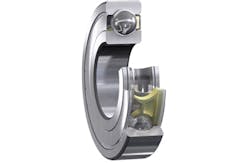Not long ago, along with the rest of Indonesian industry, PT. Leuwijaya Utama Textile Co. (Leuwitex) was confronted with a government-enforced increase in electricity costs, in its case approximately 18%. The Bandung plant includes 300 textile weaving machines and 176 twisting machines, consuming 2,120 megawatt-hour (MWh) per month. This threat to bottom-line profitability had to be reduced.
Immediately after the increases were announced, Leuwitex Bandung plant managers searched for ways to reduce energy consumption. After ensuring unnecessary lighting and standby machinery were switched off, they took a detailed look at production.
To produce daily volume of almost two tons of fabric, the Bandung factory has the usual range of textile machinery and weaving, spinning and twisting machines — all driven by electric motors. Measures were taken to correct electric motor energy losses and optimize frequency converters for the overall electricity supply.
Further, investigation showed 30% of energy consumption was by the twisting machines. Mechanically, these machines are fairly straightforward: two powerful motors drive a series of lines of high-precision spindles. The investigation further focused on frictional losses in the rotational motion of the machines and the quality of the bearings fitted at each end of each spindle. With 176 twisting machines, each having 256 spindles, this was clearly an opportunity for energy savings.
Testing for quality
Plant Manager Zenzen hypothesized three possible next steps in regard to the spindle bearings, including purchase of the following:
• New bearings from the supplier of those in the original spindles
• Low cost bearings of local Chinese manufacture
• SKF Energy Efficient bearings
Zenzen fitted the three bearing types to three separate spindle lines that ran for three months, while monitoring energy consumption. The result was an overwhelming victory for the SKF bearing, which provided approximately 10% total energy savings. Extrapolating this result to the expected lifetime of the spindles would conclusively save the most energy and deliver the lowest total cost of operation, Zenzen concluded.
“Having satisfied myself on the energy-savings issue, I needed to also be sure that the overall SKF bearing performance was equally reliable in the spindles that are so critical to the final product quality,” Zenzen says. “The twisting machines have two contra spinning spindles rotating in synchrony in opposite directions. To maintain product quality, it is of utmost importance that these two spindles are rotating exactly as expected through the entire and continuous spinning and twisting operation.”
Extending tests to a production run
Zenzen’s next test was to fit SKF Energy Efficient bearings to 10 twisting machines and begin a “production run.”
“I was delighted to find that the product quality was exactly the same as before — with constant, uniform delivery of the various designs, material thickness and feel,” Zenzen says. “This was especially important because we were in the process of expanding and also replacing some machinery in readiness for a new fabric product, and needed to be sure we could rely on the machinery.”
This initial test was extended by adding more spindle lines. Regular product quality checks convinced Zenzen he had an answer. “I was extremely happy at the outcome of this project,” he says.
The Leuwitex Bandung factory now has 25,600 SKF Energy Efficient bearings installed on its machinery and the factory is reaping the energy and financial rewards that Zenzen first envisaged.
SKF says its Energy Efficient (E2) deep groove ball bearings reduce frictional losses by 30% compared to a standard SKF bearing. Performance increase comes from optimized internal geometry, low friction grease and a special low-friction polyamide cage. Designed for grease lubricated, light-to-normal load applications, SKF E2 bearings also consume less lubricant than comparable SKF Explorer bearings and enable longer bearing service.
Shielded SKF E2 bearings can last twice as long as comparably sized shielded standard SKF bearings, SKF says. This means the number of bearings needed to run an application over its lifetime can be halved. In instances where an application is run-to-failure, these E2 bearings can conceivably outlast other components in the application.
Typical examples of applications for SKF E2 deep groove ball bearings include electric motors, pumps, conveyors and fans.
